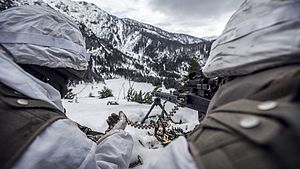Quetzenkel front
This article is a work-in-progress because it is incomplete and pending further input from an author. Note: The contents of this article are not considered canonical and may be inaccurate. Please comment on this article's talk page to share your input, comments and questions. |
The Quetzenkel front theater of operations of the Final War of the Deluge fought in Quetzenkel and in neighboring regions of Varshan. Launched simultaneously with the Invasion of Cetsencalia, the initial invasion of Quetzenkel by Varshan stalled out due to topographical concerns, better organized local resistance, and operational failure on the part of Varshan.
| Quetzenkel front | |||||||
|---|---|---|---|---|---|---|---|
| Part of the Final War of the Deluge | |||||||
 Royal and Imperial Army soldiers watch the forest, 2022 | |||||||
| |||||||
| Belligerents | |||||||
|
|
| ||||||
| Units involved | |||||||
| Xiquipilli of Quet'zen'kaal |
WES-COM Domestic Terrestrial Defense Corps | ||||||
| Strength | |||||||
| 400,000+ |
225,000+ (2022) 350,000+ (2022) | ||||||
| Casualties and losses | |||||||
| High | High | ||||||
Background
In 2013, a civil war erupted in Quetzenkel which was exacerbated by the arrival of the Sons of Levantia terrorist group in 2014. The invasion of the Sons of Levantia created a major succession crisis and dissolution of the country into rival factions. Varshan warned Urcea not to intervene until 2015, when a negotiated settlement between both countries recognized Telucti Cheveyo's claim to the country. Cheveyo, a Varshan-born warrior caste billionaire who converted to Catholicism and resided in Levantia, was viewed as a candidate that would allow both countries to retain some influence. In mid 2016, Quicksilver Industries-armed and trained forces crossed from Varshan into Quetzenkel under Cheveyo's leadership, calling themselves the "Legitimists". The Legitimists prevailed by the end of the year, and Telucti Cheveyo was crowned the first King of Quetzenkel. Disappointing Varshani policymakers, Quetzenkel immediately join the Nysdra Sea Treaty Association and did homage to the Apostolic King of Urcea, definitively aligning the country with Urcea. Over the course of the late 2010s, Urcea and other Occidental powers considerably invested in Quetzenkel, leading to major economic development and rising standards of life.
Despite its clear geopolitical defeat, Varshan would not forget what they perceived as the betrayal of Cheveyo. Varshani leadership perceived that the presence of a Urcean-aligned Quetzenkel posed a significant threat to Varshan's soverieignty, and the country began military planning for the invasion of Quetzenkel in the event of war between Varshan and Urcea.
Summary of operations
Initial invasion
Upon its entry into the Final War of the Deluge, Varshan intended to complete two lightning campaigns to eject Urcea from Cetsencalia and Quetzenkel within six months, committing more than two million combat personnel to the task. Due to the lesser presence of the Royal and Imperial Army in Quetzenkel, Varshani forces believed the 4-to-1 advantage over local defenders would be enough to induce Quetzenkel to surrender. The initial invasion also planned on having sympathy from the local population, which it did not expect from the neighboring Veltorines of Cetsencalia. Consequently, only 400,000 men were committed to the invasion of Quetzenkel.
On the morning of April 15, 2021, the Varshani Army crossed the border and defeated light resistance by Quetzen Domestic Terrestrial Defense Corps (DTDC) border guards and began to push north from the south-central border of the country. Their advance was accompanied by the dropping of Quetzeni-language pamphlets which continued for two weeks until the Royal Air Force established aerial supremacy over the country. Armored forces of the DTDC quickly advanced south from garrisons outside the capitol city of Akwesasne, meeting advanced units of the invasion force and defeating them in detail. Quetzenkel activated its entire reserve force on April 22, 2021, though mobilization of these forces would not be available for some time. The DTDC quickly reinforced the southern part of the country and established static defenses. The invading Varshani forces did not expect heavy resistance and could not immediately make up the losses of its advance armor forces, stalling the campaign.
During the initial invasion, forces from Corumm were stationed in Akwesasne and southern Quetzenkel, ostensibly to "protect against unrest in the Kingdom". These forces allowed Quetzenkel to deploy as many forces as possible to the southern border, allowing more than a hundred thousand combat personnel to take the field when Varshani forces anticipated half that number.